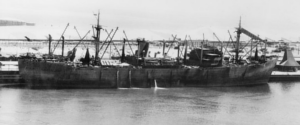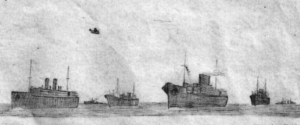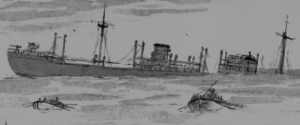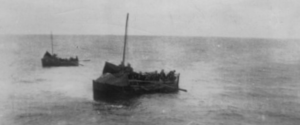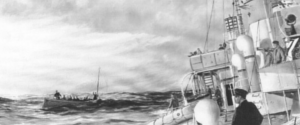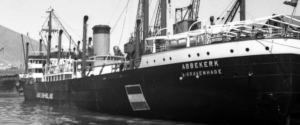
Reality was soon restored. There was rowing to be done and calling to the other boat, which brought the two boats together. Also a raft was found and some men found some room on that for we were really a bit crowded. It was still dark and not everyone was settled in yet. It was decided to tie the two boats and the raft together and await daylight.
The sea was calm but there is always a long swell in the ocean. On top of this swell are a number of smaller waves. This became too much for my balancing organs and I became seasick. I had never been seasick but now it got me well and truly. Nevertheless life went on as usual. At morning light we counted heads and we found two were missing: the first mate and a junior sailor. The reasons? The first mate went back to his cabin after the first explosion to get his papers. The second explosion occurred right under his cabin and more than likely slammed his door shut and jammed it. The junior had just celebrated his 18th birthday and had drunk a bit too much and probably never noticed what was going on.
 A plan of action had to be decided upon. First of all everybody was allocated a seat. There was room left for those on the raft so they came back to the boats. The provisions on the raft were divided between the two boats, then the rope was untied and the raft left to its own devices. The nearest land, Ireland, was 650 miles or 1000 kilometers east.
A plan of action had to be decided upon. First of all everybody was allocated a seat. There was room left for those on the raft so they came back to the boats. The provisions on the raft were divided between the two boats, then the rope was untied and the raft left to its own devices. The nearest land, Ireland, was 650 miles or 1000 kilometers east.
The sails were hoisted and a little wind brought about some movement in the boats. We were now totally depend on the navigating skills of our mates. In one boat the Captain was in charge; in the second boat it was the second mate. To sail in the direction of Ireland was the best option. First of all we had to operate the emergency radio. This has to be turned by hand to generate electric power after which our telegrapher operated the Morse key. After much turning of the handle and signalling with the key it appeared that nobody was listening on this big lake. The telegrapher feared the worst but decided to try again in the evening. If that had no results we might as well throw the whole thing overboard.
Because of all the preparations for the long sailing trip we overlooked breakfast and around midday the mate asked quietly if anybody felt like a tasty bite which would consist of two solid ships biscuits ( about 5 mm thick and 6cm square) with a slice of corned beef (fresh off the knife from a just opened tin) in between. All this washed down with ten cubic centimeters of water which was needed considering the dryness of the biscuits. The enthusiasm was not great and as far as I was concerned even though my stomach was empty I could not bear even the thought of it. The weather was good and not cold. My seasickness did not prevent me from having a good look around the boat. We were packed in like herrings in a barrel. Falling over was not possible no matter how bad the weather would ever become. The mood was also good, thanks mainly to the fact that we were alive and no longer had the fear of being torpedoed. Now we could relax both in body and mind.
A more varied group of people packed so closely together I have never seen. Many had all their possessions packed in what we now call a bumbag. A couple of others had cigarettes but no lighter while others had this the other way around, a lighter but no cigarettes. Others had the letters of their girlfriends but forgotten their own valuable papers. A couple who thought they could turn a few tricks in England with nylon stockings were now using them as balaclavas. Asking them about this they admitted they would have preferred to put them on the legs of their female companions rather than put them on their own heads. When nature called we just had to sit on the gunwale and let it drop into the Atlantic Ocean. Very fresh with plenty of room. At first everyone glanced politely away as it was somewhat embarrassing but we got used to it fairly quickly.
When my eye fell on the oars that were now lying quietly in-board, it made me think of the story of an unknown sailor who with deep emotion made known his innermost thoughts: “As soon as I get ashore I will take an oar on my shoulder and start walking inland until someone asks me what it is I carry on my shoulder. That is where I will live and work!†I cannot help thinking that this story is as old as oars are.
The next day we tried our emergency transmitter a few more times to no avail. And so we continued sailing along, two boats tied together, direction Ireland. In the meantime I again became as fit as a fiddle. Twice a day we ate and drank the same rations as the first time.

HMS Wallflower (K44) Note the dome behind the wheelhouse. This is the recently installed radar that spotted the lifeboats.
The weather was ideal but the nights were fresh and long. Our bottoms started to become noticeably painful from sitting on those hard seats which appeared to become harder and harder. A large yellow flag was hoisted in the mast to attract attention. Three days and three nights passed without us seeing anything on the horizon. That was because our little boats hardly stuck out of water giving us a very short horizon. After three days we saw a grey spot that was slowly coming closer. It turned out to be a British corvette with the beautiful name of ‘Wallflower’.
 Coming closer we identified ourselves, but the first question the British Captain asked was: ‘Are there any wounded?’ We then were hauled aboard by the crew. Everything that could be used was taken out of our lifeboats while the boats themselves were destroyed by gunfire. The ‘HMS Wallflower’ was escorting a convoy from England to Halifax but was thrown off course and fortuitously, with the aid of its radar, had chanced upon two small boats. We certainly had had an incredible amount of luck.
Coming closer we identified ourselves, but the first question the British Captain asked was: ‘Are there any wounded?’ We then were hauled aboard by the crew. Everything that could be used was taken out of our lifeboats while the boats themselves were destroyed by gunfire. The ‘HMS Wallflower’ was escorting a convoy from England to Halifax but was thrown off course and fortuitously, with the aid of its radar, had chanced upon two small boats. We certainly had had an incredible amount of luck.
 First of all the cook had quickly made a soup. This soup was the tastiest foodI have ever eaten. Not a surprise really. We were accommodated in a couple of mess-rooms. I can remember that walking was a bit difficult and sitting down even on a soft cushion was painful on our bottoms. The officers and crew were very helpful and it seemed they were more pleased about our rescue than we were.
First of all the cook had quickly made a soup. This soup was the tastiest foodI have ever eaten. Not a surprise really. We were accommodated in a couple of mess-rooms. I can remember that walking was a bit difficult and sitting down even on a soft cushion was painful on our bottoms. The officers and crew were very helpful and it seemed they were more pleased about our rescue than we were.
A few hours later the alarm sounded and with much ringing of bells the watertight doors were shut. We were below decks and in case of an emergency totally trapped. I looked around and came to the conclusion that the skin of the ship was terribly thin. I decided there and then that if this was a false alarm and the doors would be opened, I would in any case go out on deck and not return down below. However it never got that far, for as soon as this corvette had returned to the convoy we were distributed over the ships.
Every ship took as many as it could accommodate. The fourth engineer and I found ourselves on an old steamship called ‘SS Widestone’. The captain and officers were friendly enough but reserved as if they were somewhat embarrassed for the old steam rustbucket on which they sailed. True we could see that in peacetime this ship would have been demolished long ago. Yet these people earned our respect. The ship was empty and the screw turned half in, half out of the water. The main bearing of the steam engine had so much slack that one could count every revolution on the bridge. The speed of the convoy was seven knots and we could only just keep up. They were stoking the furnace as if their lives depended on it. And of course this was true. Thick black smoke bellowed out of the funnel. The chief engineer was busy filling the grease pots which needed constant attention. Boy, oh boy! A real tramp steamer with a crew to match. The messroom and cabins were all decorated in a dark colour, small portholes and very small globes. Sober meals in an even more sober environment. It seemed that on this ship, like ashore in England, everything was rationed.
We arrived in New York without any further difficulties in the first week of September 1942. Before we left the Captain of the tramp asked us if we had any objections if he added a few extras to the expenses he had incurred accommodating us. Shaking our heads we signed not forgetting to leave sufficient room between the bottom of the invoice and our signature.
<< previous chapter —————————————————————–next chapter >>

